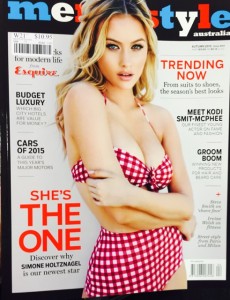Another example of why the MPA trial is flawed
 The MPA trial of new magazine supply rules would not give the ability to block junk like this from Network Services. I satisfy consumer demand for products like these with items off of which I make 50%+. I choose the products to tell a story and reflect a difference.
The MPA trial of new magazine supply rules would not give the ability to block junk like this from Network Services. I satisfy consumer demand for products like these with items off of which I make 50%+. I choose the products to tell a story and reflect a difference.
Network should distribute these products without my express permission – which would not have been forthcoming. But they did, because they have done for years. This has to stop as it is this type of scale out that disadvantages us. It dilutes our ability to compete with other retailers of magazines.
When I saw the products out this morning I took them off for immediate return. Sure some might sell – but I will make more from the space location with smarter product placement.
The reality, however, is that the supply of these products is outside the scope of the MPA trial. They don’t want to address this type of supply, not really … which is disappointing because this type of supply drives newsagent behaviour and newsagent behaviour is what they want changed. But they don’t get that.
Note: I would not deny Network the right to distribute the product – only their ability to scale out without newsagents opting in.
Did you receive the consignment stock from Consolidated Product Holdings?
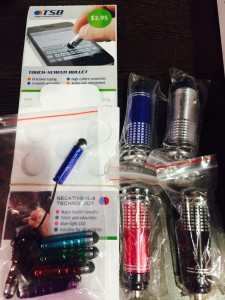 We received a car air purifier and a touch screen bullet this week from Consolidated Product Holdings on consignment.
We received a car air purifier and a touch screen bullet this week from Consolidated Product Holdings on consignment.
The letter from CPH claims they have introduced the products in partnership with magazine distributor IPS.
I didn’t order the products and have not entered into any agreement in relation to these products. Therefore, I don’t consider myself or my business responsible for these items supposedly on consignment as any consignment relationship would need my agreement for there to be an agreement. I have not agreed.
What a waste of time.
I have excellent tech products off of which I make significantly more margin. I do not need this low margin no-name brand product in my newsagency.
It galls be that CPH has sent this to newsagents as, unfortunately, some will do what CPH says and, I suspect, pay a price for it.
While I am no lawyer, I doubt I have an obligation to do anything with the unrequested products they sent.
If IPS is involved with this, why? This does not make sense to me.
I’d love to hear from other newsagents on this.
Correspondence with the ANF on the proposed magazine supply rule changes
I emailed the CEO of the ANF on May 31 after being shown correspondence between him and a newsagent in which he referred to me. Click here to see the text of my email.
The ANF chairman responded to me last week. Click here to see this letter
Here is my response sent yesterday to the ANF Chairman, Stuart Kilborn, on this matter of equitable magazine supply for newsagents.
Stuart,
Thank you for your June 4 letter responding to my email to ANF CEO Alf Maccioni of May 31. I emailed Alf has he has been engaged in correspondence in which he comments about me and the Australian Newsagency Blog. While I am happy to respond to your letter, I am surprised that Alf did not respond to me as he is happy to talk about me behind my back.
Also, you write to me at Tower Systems. My agitation on behalf of newsagents and my own newsagency businesses on this issue is via the newsagency blog. The blog is a non commercial activity I spend my own time on publishing my opinions on matters I think will interest newsagents.
In your letter you say:
Whilst we habitually choose to focus on positive impacts for our channel the negative effect you are potentially causing the channel through misleading information requires us to respond. If what newsagents have told me is true, in this matter of the MPA trial the ANF has not been focussing on positive impacts as it has reportedly engaged in character assassination with no regard as to the facts.
I’ll not respond at this time to much of the first two pages of your letter as what you have written does not relate to the MPA trial whatsoever.
For the record, I first became involved in discussions on magazine supply rule changes in late 2013. These discussions, including consideration on the rules at the core of the MPA trial today, predated the involvement of the ANF. My position has not changed.
I have called for newsagents to withdraw support for the ANF on the matter of the MPA trial because I think the ANF is profoundly wrong. It is unfortunate that you label my disagreement as a lack of courage. You imply that it is courageous to support the ANF and not courageous to disagree with the ANF. So much for robust debate. So much for free will. Your statement is ignorant nonsense.
I have read the MPA submission to the ACCC. In your letter you go beyond this and appear to put the position of the small number of publishers in the MPA and the two major magazine distributors – ahead of the interests of your members.
You ignore that the ACCC conference attended by the ANF, newsagents, publishers and distributors was called for by newsXpress. The ANF could have called for this conference but it did not. Given what was discussed at the conference it was worthwhile for newsagents to have had the opportunity if only to speak directly to the ACCC about the unfairness of magazine supply to our channel compared to those with which we compete.
Left to ANF representation only the conference would not have occurred and newsagents would not have had the opportunity to, for the first time, speak directly to the ACCC about the matters covered. Shame on you and the ANF for not pursuing this opportunity for subsequently denigrating some of those newsagents who did participate.
At the ACCC conference, the CEO of the ANF said the organisation has consulted with newsagents. All I can find to support this claim is a brief mention in a note from the CEO in National Newsagent magazine and a brief mention in an ANF news email. As I have written previously, on this most vital of matters, the ANF ought to have hosted capital city and regional centre forums to canvass newsagent opinions. It ought to have conducted an industry wide survey on each of the rules to be tested as documented to the ACCC by the MPA.
The ANF did not do these things.
The claim by your CEO to the ACCC conference that the ANF consulted is not supported by the evidence available. If there is other evidence of newsagent consultation please share it.
You say Consultation is a word that is loosely thrown around, and often regarded as ticking a box then proceeding down your own path. Maybe that is what consultation means within the ANF. I disagree with your definition. Consultation is a process of actively engaging with those you say you represent to fully explore and understand their views prior to you forming your own views as to how to represent their interests. The ANF has not done this on this issue.
THE NEWSAGENCY BLOG
I do not use the blog to manufacture negative factors and am offended that you claim I do.
The Newsagency Blog publishes directly through my posts and through comments by readers items that are encouraging of newsagents and those who service and engage newsagents commercially. Sure it shines a light on negative issues. This is done with facts and in an effort to change behaviour.
My take is that if I write a post that is critical of the ANF you label it as negative for the channel. I disagree with such a position. The ANF has made its own failure of representation of newsagents. The failure is exacerbated because of poor communication and a refusal for open and public discussion on matters of importance.
THE ANF CHAIRMAN
In my email to your CEO I make the point that you, Stuart, called a newsagent with the sole purpose of speaking about me. This is a newsagent to whom you had never spoken before. To suggest otherwise as you do on page four of your letter is unfortunate spin that seeks to divert attention from your actions. I don’t care whether you are paid for your time. Your letter goes on to canvass issues not pertinent to this discussion. You did call at least one newsagent to agitate against me and that’s okay. My point on this in my email to your CEO is that you should have the guts to speak to me. That you went behind my back as a whiney school kid is like communication reportedly by other ANF staffers about me and this issue of magazine supply.
If you have an issue with me, confront me. I have written to the ANF about comments made by Ann Nugent in Queensland about me which upset several Queensland newsagents. I wrote to Ann and she did not respond. I wrote to Alf and he did not respond. If Ann did not make the comments she should say so and I can go back to the newsagents and ask whey they would make the allegation up. If Ann did make the comments then she need to answer for her behaviour. Remaining silent damaged the ANF.
Your letter then turns to the ACCC conference., noting that I say every newsagent who spoke at the conference disagreed with your CEO. To support your claim you include a note from the ACCC minutes. The quote you have included offers no support of the ANF’s position. Indeed, the minutes note the terms on which Ms Dixon agreed to participate in the trial, terms not reflected in the documentation submitted by the MPA to the ACCC.
PUBLIC DEBATE
The concerns in discussion between us relate to the poor performance of the ANF on this issue of magazine supply to newsagents and, most recently, the poor representation of newsagents on the issue of the MPA pilot of proposed new magazine supply rules.
The ANF says the trial is a good thing. I disagree. This is what I propose the ANF debates publicly with me. The worst outcome from such a public debate would be those attending agreeing that the ANF has not acted in the interests of members. The best outcome from an ANF perspective would be that those attending do agree with the position taken by the ANF. Either way newsagents benefit from a transparent exploration of how their interests have been represented and, more broadly, what is best for their representation on the issue of magazine oversupply.
I suggested a debate because it seems to me that the ANF has not debated the proposed rules for had it done this it would not have endorsed them. Remember, the documented rules are different to what the ANF claims the rules to be. For example, in the documented rules there is no provision for newsagents to control range and volume, no provision for early returns … yet the ANF says these benefits are part of the trial. As I noted at the conference, If this is the case why not document that.
A public debate would demonstrate to newsagents that the ANF is transparent and that it is consulting on this matter.
In your letter you say you have welcomed on many new members during this recent phase. Please advise your membership numbers prior to this phase and now. This is an invitation for you to be transparent.
CONCLUSION
If the ANF had professionally and thoroughly represented newsagents on this matter it would have:
- Ensured early returns were allowed in the proposed magazine supply rule changes.
- Ensured newsagents had control over range and volume in the proposed supply rule changes.
- Held public forums to harvest opinions from all newsagents.
- Engaged actively with all magazine publishers and not just the three members of the MPA on this issue.
- Stopped criticising personally anyone who criticised the performance of the ANF on this matter.
- Ensured that the trial is a real world trial testing processes and rules that can be applied channel wide rather the current trial involving a level of non real world support for some participants.
- Been more thorough in advising newsagents about the trial in its various channels of communication.
- Been more robust in demanding magazine distributors use the sales data provided by newsagents to set supply levels.
- Used the proposal of the trial as an opportunity to agitate on the proposed continuation of anti-competitive against newsagents by magazine distributors compared to their treatment of our competitors.
The ANF says the trial is necessary to provide an understanding of magazine performance and newsagent engagement with the category. I say that such an understanding can be gained today by a thorough analysis of the data.
I believe in the newsagency channel and work hard in many ways outside your gaze and knowledge in support of newsagents, for the future of the channel. The MPA trial is trialing the wrong parameters in a wrong way. For newsagents to have a bright future they need fair and equitable supply of magazines – on terms that enable them to be commercially competitive with other retailers of magazines. Anything short of this is not a solution. The issue at hand here is not the trial so much as it is the proposed new supply rules being tested by the trial, rules the ANF has not challenged.
Remember, the ANF played a central role in the deregulation of magazine supply. Its representatives at that time failed newsagents miserably on this matter. They failed to seek and achieve for newsagents a change to the terms of supply to reflect a deregulated environment. Their failure in 1999 means that today our channel has magazine supply rules from the era of protection and regulation while our competitive benefit from supply rules designed for a competitive post-regulation marketplace. This is what must be fixed. I see no evidence in your correspondence and the ANF submission to the ACCC that the ANF gets this.
Stuart, you have to ask yourself, are you the right person to lead the ANF, are you the best the channel has available? Asking this question does not make me a bad person nor does it mean I am not courageous.
I am happy to meet to discuss this issue at any time face to face.
—————————————————————————-
Footnote: The MPA ought to have thoroughly analysed all data available on magazine supply, sales and returns prior to even considering this trial. They should have also discussed possible solutions with all stakeholders including other publishers outside their small group, all distributors, all newsagents and others involved directly in the magazine management within newsagencies.
This trial is ill-conceived because it was not properly researched prior to designing the proposed supply rules to be trialled.
As soon as it as invited to be involved last year, the ANF should have written extensively on the trial in its various communication platforms and actively sought newsagent feedback from far and wide. That it did not do this has left the ANF ill-informed and supporting a trial that does not address the fundamental challenges faced by newsagents, the uncompetitive terms of supply of magazines to our channel.
Newsagents sell close to 50% of all magazines in Australia. There are ways we can grow this. There are ways magazines can be profitable for us. A trial of the ways and processes that could be employed to achieve these outcomes is appropriate.
It seems to me that few involved in the MPA trial are actually interested in putting the interests of newsagents ahead of their own interests.
Here’s an example of why newsagents need the early returns right
 This issue of Men’s Style magazine has been on the shelves a little over three weeks and we have not sold a single copy. This issue is loss making for us. Today, we early returned all stock to mitigate our situation. Without the right to early return I would not have been able to reduce the extent of the financial loss from this issue of Men’s Style.
This issue of Men’s Style magazine has been on the shelves a little over three weeks and we have not sold a single copy. This issue is loss making for us. Today, we early returned all stock to mitigate our situation. Without the right to early return I would not have been able to reduce the extent of the financial loss from this issue of Men’s Style.
If newsagents cannot control the titles we receive and the volume of each issue we must be able to early return.
A waste of paper: one week’s magazine returns
 This photo shows one week of magazine returns from one newsagency. None of the magazines has been topped – so the boxes contain full magazines which have failed to sell in time and others being returned early because considerably more stock was supplied than had ever been sold in this newsagency.
This photo shows one week of magazine returns from one newsagency. None of the magazines has been topped – so the boxes contain full magazines which have failed to sell in time and others being returned early because considerably more stock was supplied than had ever been sold in this newsagency.
What a waste of paper, fuel, time and space.
The time spent on managing and processing this excess stock is a financial and time management burden on newsagents, it holds this business and thousands of newsagents back.
No trial is needed to understand this problem. Magazine distributors and magazine publishers have all the data they need to provide newsagents with fair and equitable supply. That they do not use this data is an environmental and financial scandal.
US magazine newsstand sales drop 14.2%
Over the counter magazine sales in the US and Canada were down 14.2% for the first quarter of 2015 compared to the same quarter a year earlier. While better than the 15.6 decline for the fourth quarter of 2014, the Q1 2015 decline is concerning.
I have taken results from a news release from Magnet an organisation formed by magazine wholesalers representing 99% of magazines sold.
If you read the release there is a claim that the sales decline is being driven by short supply. The release also documents challenges being faced by stakeholders including the reduction in retail space:
While there were some titles as well as entire publishing lines that had sales increases in the first quarter, overall the sales trend continues to decline. MagNet, like other interested industry participants, has continually recommended that the industry find a way to work together, with major publishers, distributors and wholesalers developing a strategic plan to engage retailers to again focus on our category. But currently, we see no signs that indicate this is happening. Instead, we see some retailers removing checkout pockets and reducing the size of mainline fixtures. Without a concerted effort by the major industry leaders to sell the overall value of our products to retailers, the loss of retailer real estate dedicated to magazines will continue as sales decline. Magazines at retail are an impulsive purchase. If consumers can’t find our product, they can’t purchase it.
This is happening in Australia too. Publishers and distributors need to understand the economics of retail and to fully understand the cost of each magazine pocket where the cost includes the space, services, labour and opportunity cost.
If the MPA was smart they would have undertaken this research before commencing testing new supply rules as I don’t think they understand why newsagents do what they do with magazines. There is bo point in testing a solution until this is understood. Key to achieving understanding is to be certain as to the costs points and what the costs actually are.
In the typical Australian newsagency today, magazines are primarily a destination purchase in my view. To maintain that space we need to range destination titles. If we had control over supply, smart newsagents would increase their range in pursuit of increased sales. Unfortunately, the paternalistic approach to magazine supply in our country is the key factor in driving magazine sales down.
But back to the North American results. While their situation is different, it is interesting to see suppliers being targeted for their role in the sales outcome.
How many magazine titles are needed to satisfy demand?
 This photo shows the typical range of magazine titles you will see in a drug store in the US, the type of retail business which most closely resembles a newsagency. The unit holds 156 regular sides titles. In Australia, where subscriptions account for a lower proportion of overall circulation than in the US, I think 156 titles is too few for a destination magazine store.
This photo shows the typical range of magazine titles you will see in a drug store in the US, the type of retail business which most closely resembles a newsagency. The unit holds 156 regular sides titles. In Australia, where subscriptions account for a lower proportion of overall circulation than in the US, I think 156 titles is too few for a destination magazine store.
Australian supermarkets carry around this number, sometimes up too 200 titles while convenience and petrol outlets carry considerably fewer.
Considering sell through rates, the cost of retail space and the opportunity cost of this, my feeling is that the ideal range for a city or suburban newsagency is between 500 and 700 titles – around four of the units in the photo. In regional and rural areas the number could be somewhere between 800 and 1,000 titles depending on the costs of the business.
A good step we can take to controlling supply is controlling space allocation. This is best done with flexible deep magazine shelves on which we allocate one pocket per title and advising the distributors in writing of the total number of their titles we have space for. The type of fixture in the photo is ideal for this. It is what I use in my shops.
Clarity on the MPA trial next steps
Magazine Publishers Australia (MPA) has announced the pilot program to trial proposed new magazine supply rules will commence next month. While the ACCC has made no announcement since the conference a month ago, the MPA was granted interim authorisation by the ACCC and ti is this which enables them to proceed.
I am disappointed that despite their claim to want to understand newsagent concerns and to work with newsagents, the MPA has not made any steps to do this other than whatever it does through the ANF, the body all newsagents speaking on this issue at the ACCC disagreed with.
At the heart of the ANF endorsement is their claim for the need of data. As I showed in a video a couple of days ago, newsagents have excellent data on magazine oversupply. For more information on why I think the pilot is inappropriate at this time see this video.
Here is the press release from the MPA announcing the pilot:
MAGAZINE PUBLISHERS AND DISTRIBUTORS PARTNER FOR A NEWSAGENTS PILOT
25TH OF MAY 2015Under the ACCC guidance, Magazine Publishers Australia (MPA) and Magazine Distributors – Gordon & Gotch and Network Services have partnered to conduct a Newsagents pilot in 20 stores.
The 20 stores chosen, which represent a wide variety of newsagents, will start the pilot early June 2015. The aim of the pilot is to create a new efficient supply model for magazines. The pilot stores’ results will help shape a proposed code of conduct for distributors and publishers within the newsagency channel.
Mary Ann Azer, MPA Executive Director said, “This pilot is the first of its kind. It represents a large investment in resources whether time or money to improve magazines in newsagencies. MPA members sell over 50 million copies of magazines to newsagents annually and our aim is support newsagents to become a destination shop. ”
Alf Maccioni, CEO of the Australian Newsagents Federation, the industry body representing 2300 newsagents across Australia, said: “We support any measure that will help newsagents increase their profitability within the magazine category. Magazines supply have been a legacy issue that to date has not been resolved. From this trial we believe that we will be able to obtain some valuable data that the ANF will share amongst its members. We are pleased that all parties have demonstrated a resolve to fix this issue”
All newsagents want is fairness in magazine supply. If they are to be held responsible for their indebtedness to magazine companies they must have the ability to control this level of indebtedness. If they are to be competitive with supermarkets, petrol and convenience, they bust have control facilities which provide this. This pilot program is not trialling any magazine supply rule changes to give newsagents these things.
I note the ANF CEO claiming 2,300 members. Their Communications head says they have 2,000 members. regardless of the number, they have not sought the views of these newsagents before deciding a position on behalf of them.
Why the ANF is wrong about magazine performance data in newsagencies
The CEO of the ANF says the ANF supports the MPA pilot of new magazine supply rules for newsagents to gather data on magazines in newsagencies. The CEO ignores the considerable data set already available in newsagencies. Here’s a new 11 minute video from me outlining some of the data available.
This video illustrates that as a channel we have all the data necessary to support our claim of unfair treatment of magazine supply.
It galls me that our suppliers and the association that ought to be representing newsagents ignore this data.
We have this data because the magazine distributors themselves required us to gather it and provide it to them.
If the ANF consulted with newsagents as it claims to it would have known this data is available. Instead, it falls into line with the distributors and fails its members along the way.
Further submission to ACCC seeks fairness for newsagents on magazine supply
This morning I made another submission to the ACCC on the issue of magazine supply, encouraging them to collect data to assess the fairness of the newsagent supply model versus the supply model used for our competitors. Here is the full text of the letter:
Magazine Publishers of Australia application A91472
While this letter is written on behalf of newsXpress newsagents, it is written with my experience serving in excess of 1,800 newsagents using the Tower Systems newsagency software and with the support of many other newsagents who have contacted me on this matter.
The model under which newsagents are supplied magazines compared to their competitors competitively disadvantages newsagents.
The disadvantage newsagents suffer will not alter from the implementation of a Distribution Code of Conduct as promoted by the Magazine Publishers of Australia (MPA) and proposed to be piloted as outlined in their Application A91472.
The application by the MPA to the ACCC opens for consideration the various models of supply of magazines in Australia.
For the ACCC to make an informed decision and to consider the public benefit of any change, we submit that the ACCC needs to undertake a thorough assessment of magazine supply.
The current magazine distribution model used by the distributors for newsagents is the same model that existed prior to deregulation in 1999. The model used for competitors of newsagents is one established post deregulation. The two models are quite different. Gordon and Gotch on their corporate website provides insights into how it works with two competitors of newsagents:
- GGA met with Newslink in April as part of the ranged review process to discuss ranging needs for the second half of 2015. Results from the range review will be communicated to publishers in the coming weeks, with the updated range to hit stores in July.
- WH Smith has new stores opening in Perth Airport, Melbourne Airport and Sydney International in the next six months. In addition to the Airport Sites there will also be a new hospital store opening in NSW. Layla Crawford commenced as the new category buyer for the re aligned Magazines and Books ‘Readables’ category on May 5th. The range review process has commenced for the July – Dec 2015 period with meetings scheduled for late May.
In their application, the MPA submits that it needs data to assess proposed changes. We say the MPA has access to all the data it needs to assess the situation in which small business newsagents find themselves.
We suspect that competitors of newsagents receive magazines through a set of rules, processes and commercial arrangements that competitively advantage them and that this could not be achieved if newsagents were treated the same. We suspect the treatment of newsagents enables publishers and distributors to treat newsagent competitors more favorably. We think there is data available to support this claim.
We urge the ACCC to request from the magazine distributors, Gordon and Gotch and Network Services, the following data points per magazine title distributed over the last year, tabulated in a spreadsheet to enable easy sorting and analysis.
- Title.
- Issue number.
- Newsagents:
- Number of newsagents supplied.
- Volume supplied to newsagents.
- Volume early returned from newsagents.
- Average on-sale (period on the shelves) for early returns.
- Volume returned by newsagents.
- Sell through %.
- Supermarkets.
- Number of supermarkets supplied.
- Volume supplied to supermarkets.
- Volume early returned from supermarkets.
- Volume returned from supermarkets.
- Sell through %.
- Petrol and convenience.
- Number of P&C supplied.
- Volume supplied to P&C.
- Volume early returned from P&C.
- Volume returned from P&C.
- Sell through %.
This data will enable comparison of sell-through efficiency by channel. It will also illustrate the range of titles supplied to each channel and the relative volume by channel, enabling an assessment of viability.
We urge the ACCC to request from the magazine distributors statements outlining how title ranges and issue supply allocations are set for each of their main retail channels: newsagents, supermarkets and petrol and convenience.
We urge the ACCC to request from magazine distributors and publishers details by title and by retail channel the wholesale price, stocking fee, marketing fee, returns processing fee and any other discount or financial support provided in any form.
We urge the ACCC to request from magazine distributors statements regarding returns processing requirements by retail channel: who counts returns and when and who pays for this; are returns physically returned?; when are returns credited?
We are confident that the information outlined above will demonstrate a less competitive model used for newsagents compared to other retailers.
Despite claims by magazine distributors and publishers, newsagents cannot control the range of titles they receive nor the volume of each issue they receive.
While the magazine distributors hold newsagents accountable for their level of indebtedness, they offer newsagents little ability to actually control their level of indebtedness.
Newsagents want to run commercial and competitive businesses. The current magazine supply model to them makes them uncompetitive in the magazine category. There is nothing in the proposal from the MPA that will improve the competitiveness of newsagents.
How much damage did the ANF CEO do in contradicting newsagents?
I have been thinking about the April 23 ACCC convened conference to discuss the proposed magazine supply rule change pilot and, in particular, the contradiction of submissions of newsagents by the CEO of the ANF.
Every newsagent speaking at the ACCC conference objected to the pilot as proposed and the magazine supply rule changes at the heart of the pilot. It was only after every newsagent had spoke that the ANF CEO tore them down. Here’s how the minutes record his contribution:
Alf Maccioni (CEO, ANF) said the ANF had informed its members about the Pilot, with articles in newsagency magazines and newsletters. He said the ANF currently had around 2300 members (of a total 3500 newsagents). Mr Maccioni said the ANF supported the trial because oversupply of magazines was an issue which needed to be discussed.
What the ANF CEO failed to detail is exactly what informing ANF members involved. I have been told it was a passing reference in an issue of National Newsagent magazine and a passing reference in an email to members. ANF members tell me there was no consultation. I am certainly not aware of any effort whatsoever to determine the views of newsagents.
What if the ACCC places more seated in the views put by the ANF CEO than the newsagents at the Conference? What if this one small contribution from the ANF CEO is considered to be representative of newsagents?
Talking with newsagents over the last couple of weeks, I know this is not what they want. The do not want the ACCC to consider for a moment that the ANF understands what newsagents think about this trial.
I am in the middle of the Newsagency of the Future workshops and there are many questions about the proposed pilot and the position of the ANF. Had the ANF CEO made himself accessible I am sure he would have had his position challenges by newsagents who disagree with him.
Footnote: going into the meeting I shook the hand of the ANF CEO. He didn’t seem to want to talk. While some newsagents held back and talked, the ANF CEO was gone. Two more opportunities missed for discussion with newsagents. So much for consultation.
Usually I would not care about what the ANF says. However, in this situation, they have some standing. It is unfortunate they use that standing to sprout ill-informed and ignorant views.
Magazine supply workflow from MediaScope
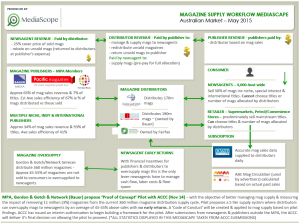 I like this infographic from MediaScope showing the position of newsagents in the magazine landscape and our uncompetitiveness due to out of date supply rules. It makes a complex issue understandable. It makes the case for fairness for us so we can compete.
I like this infographic from MediaScope showing the position of newsagents in the magazine landscape and our uncompetitiveness due to out of date supply rules. It makes a complex issue understandable. It makes the case for fairness for us so we can compete.
MediaScope infographic of the magazine landscape in Australia
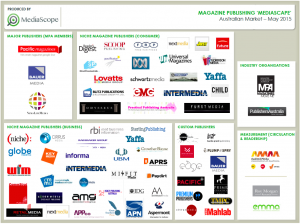 MediaScope has produced this terrific infographic on the magazine landscape in Australia. I’ve loaded it here to show how extensive this is and illustrate how the majority of publishers have not been consulted as part of the MPA new magazine supply rules pilot program.
MediaScope has produced this terrific infographic on the magazine landscape in Australia. I’ve loaded it here to show how extensive this is and illustrate how the majority of publishers have not been consulted as part of the MPA new magazine supply rules pilot program.
Unmerchantable product from Network Services
 This photo shows the state of one magazine title distributed by Network Services to a newsagent recently. This magazine is unmerchantable: not fit for retail, yet Network Services sent it.
This photo shows the state of one magazine title distributed by Network Services to a newsagent recently. This magazine is unmerchantable: not fit for retail, yet Network Services sent it.
Network is part of Bauer Media and Bauer thinks newsagents need help to manage and display magazines. They ought to tidy their own house first.
No wonder newsagents don’t trust Bauer when they receive products like this.
This Sponge Bob title is a good example of unmerchantable product.
While I expect the company would have an excuse and offer an apology, it happens too often for it to not be the result of poor leadership and poor management in Bauer when it comes to managing the newsagency distribution side of their business.
Further submission to the ACCC on proposed trial of magazine supply rule changes
Yesterday, I lodged another submission with the ACCC in relation to the application by the MPA to trial new magazine supply rules for newsagents. Click here to download the submission. The submission is also on the public register of the ACCC.
Like my first submission which the ACCC already has to consider, this submission was made on behalf of newsXpress members, based on my experience through Tower Systems serving 1,800+ newsagents and in pursuit of fairness for all newsagents. Here is the submission in full:
——————
Our view remains that the proposed MPA Pilot is ill-conceived, poorly constructed and not appropriate to meet the public benefit claims made in Section 4 of the application.
No information was presented at the Pre-Decision Conference or since to address the concerns raised in the newsXpress submission of April 23, 2015 nor the oral submissions newsagents at the Pre-Decision conference.
We urge the ACCC to embrace the opportunity to more thoroughly explore the anti-competitiveness of current and proposed magazine supply arrangements to newsagents compared to those applied to competitors of newsagents. While this issue is considerably larger than the issue of the Pilot, it goes to the heart of the future of the small business newsagency channel in Australia.
While the Pilot has been proposed to test what is claimed to be a new approach to the supply of magazines, we note it only relates to newsagents.
Competitors of newsagents are already treated with supply rules considerably more beneficial than the magazine supply rules the MPA proposes to trial for newsagents.
This difference between the supply of magazines to newsagents versus their competitors sits at the core of concerns held by newsXpress and newsagents more generally. The proposed Pilot does nothing to address these concerns.
At its heart, this Pilot seeks to test the continuation of magazine supply rules to newsagents that ensure their inability to compete with supermarkets, petrol outlets and convenience stores in the magazine category.
PRE-DECISION CONFERENCE
Every newsagent who presented to the conference spoke against the proposed magazine supply rules at the heart of the Pilot.
The MPA did not directly address any specific issue raised by newsagents nor did it directly address the comprehensive and specific complaints raised by newsXpress. Instead, the MPA relied on generalities.
Considering various points made by MPA and Bauer Media representatives at the conference, there is a gap between what has been documented to the ACCC about the Pilot and what has been said will be done as part of the Pilot.
For example, newsXpress and others expressed concern that the Pilot is to test rules that deny newsagents the opportunity to early return magazines. On page 4 of the minutes of the Pre-Decision conference we can see Mr Varricchio of Bauer Media and the MPA to say the MPA plans to allow early returns after 30 days. While we say the 30-day moratorium on early returns is unfair, it is not referred to in the documentation submitted to the ACCC for authorisation.
Mr Varricchio advised that newsagents participating in the pilot will have control over the range of magazines they stock. This is not covered in the submission from the MPA to the ACCC. There has been no evidence presented by the MPA as to the extent of control newsagents could have over the range of magazines they stock, whether the claimed control is being or can be applied uniformly, what the claimed engagement of participating newsagents looks like for them in the Pilot and in the future and or the magazine distributor processes to be put in place to enable such newsagent control over the range of magazines they stock.
Ms Azer, Director of the MPA, said the MPA would use POS data, among other data, to research how customers shop the magazine category. We note that while such data has been available for years, the MPA has made no effort to access same.
Mr Alf Maccioni, CEO of the Australian Newsagents’ Federation, told the Pre-Decision conference that the ANF had informed its members about the Pilot, with articles in newsagency magazines and newsletters. We can only find brief and passing comment about the Pilot by the ANF: to its members once in one paragraph in its magazine; and, once in as a topic in a general email to members. In neither case did the ANF adequately inform its members. We therefore say the ANF itself is not appropriately informed to speak on behalf of newsagents on this topic.
The most comprehensive information from the ANF information was published May 6, 2015. The ANF has not actively engaged with its members about the Pilot.
Every newsagent who spoke at the Pre-Decision conference spoke against the Pilot rules and the inequity of newsagent magazine distribution arrangements. No newsagent endorsed or supported the position taken by the ANF.
While the Pre-Decision conference was a welcome airing of concerns, the disconnect between claims made by the MPA and the documentation supplied by the MPA is considerable. Newsagent concerns about the disconnect are heightened because of a lack of trust that has built up over decades of oversupply and anti-competitive treatment.
HOW NEWSXPRESS FORMED ITS VIEWS
newsXpress actively sought feedback from its members at face to face meetings, via a private online forum, through face to face in store visits and through thorough telephone consultations.
The concerns raised by newsXpress are the concerns of the vast majority of its members following this comprehensive consultation process.
Following the Pre-Decision conference, newsXpress invited further feedback from members and this feedback has helped inform the views reflected in this submission including our advice that all concerns in the initial submission remain of concern to us.
MPA NOT PRERESENTATIVE OF ALL PUBLISHERS
The MPA is made up of three publishers, less than 5% of all magazine publishers in Australia. The vast majority of publishers who supply magazines to the newsagency channel have not been consulted as part of this process yet the Pilot seeks to test magazine supply rules that will impact their businesses.
It appears to us the Pilot has been constructed for the benefit of MPA members to the possible detriment of newsagents and other magazine publishers.
The MPA developed its Pilot and associated rules without consultation with newsagents. While it sought endorsement from the ANF, there has been no consultation with newsagents by the MPA nor by the ANF.
Any Pilot ought to be constructed with a more representative group of stakeholders including more publisher representatives and more newsagents.
WHERE ARE THE SAVINGS?
The MPA says that the Pilot is about reducing costs. There is nothing in the Pilot that reduces costs for newsagents and no evidence was presented to the Pre-Decision conference about expected cost savings for newsagents. It appears to us that the cost savings will be to the benefit of the magazine distributors and some magazine publishers over others.
Whereas newsagent competitors can be certain they will not be supplied more magazines than they have space to display, newsagents have no such certainty.
The only way for newsagents to reduce costs associated with magazines would be for them to be supplied such that more than 60% of all stock of each magazine title supplied is sold within 30 days and that full copy returns are eliminated.
IF THE MPA WAS SERIOUS
If the MPA was serious about its intent to optimise the supply of magazines to newsagents and to assist newsagents to more efficiently manage the magazine category (MPA ACCC application 4.a) it would have undertaken a study of the current performance of newsagency businesses to uncover the most efficient, the most successful at year on year sales uplift and the most engaged with the category. It would have thoroughly analysed these businesses and provided best practice advice to the newsagency channel.
Coming at the problem as a supply problem but not looking completely at the supply challenges and issues, the MPA has come up with a draft set of rules, what they call a Code of Conduct, that inadequately address the key financial and operational concerns of newsagents, the key factors which drive current newsagent behavior.
If the MPA was serious about its intent to optimise the supply of magazines to newsagents and to assist newsagents to more efficiently manage the magazine category it would engage with the magazine distributors on:
- Supplying magazines based on actual sales data supplied by newsagents and to a sell-through target which makes these magazines financially viable for newsagents. As put already by newsXpress, the print run / supply matrix proposed in the draft rules are not viable for newsagents for most categories of titles noted.
- Understanding from each newsagent the total space available for magazines so as to put in place rules to ensure no supply beyond the physical space allocated to magazines.
- Ensuring newsagents had absolute control over all new titles to carry.
- Stopping the need for newsagents to return unsold stock. The current system requires many newsagents to pay to return stock that has not sold while not giving those newsagents the ability to control supply.
Instead, the MPA, and in particular the Bauer Media controlled Network Services, has participated in a process which as recently as this past week has seen newsagents reissued magazines which have failed, newsagents supplied magazines to a volume based on previous sales which will deliver a loss-making sell through rate of 40% or less and introduced new titles without any regard as to their appropriateness for the newsagent businesses to which they have been sent.
In short, for all its statements of wanting to help newsagents some organisation in the MPA have most recently been treating newsagents in ways which are contrary to what are claimed to be the goals of the Pilot.
THE DISCONNECT OF COMMERCIAL REQUIREMENTS
At the heart of the unprofitability of magazines for newsagents is the commercial requirements of the two main magazine distributors Network Services (owned by Bauer Media) and Gordon and Gotch (owned by PMP Limited).
Gotch and Network are effectively trucking companies – they make money on delivering bundles of magazines. They have complete control over what they ship to newsagents whereas they to not have the same control over what they ship to all other magazine retailers.
The ability of Gotch and Network to control magazine supply to newsagents is vital to their commercial performance. It is understandable that Gotch and Network make decisions to serve their commercial needs ahead of newsagents.
The supply decisions of Gotch and Network are the single biggest factor in the financial losses endured by newsagents from magazines as well as the single most significant driver of behavior of newsagents toward magazines.
The impact of deregulation has been Gotch and Network having less control over the volume of magazines distributed outside the newsagency channel. With newsagents the only channel over which they do have control through pre-deregulation contracts distributors engage in practices that have driven up costs to newsagents, creating the problem the MPA says it wants to address.
WHY THE IMPACT OF THE 1999 DEREGULATION NEEDS TO BE ASSESSED
At the heart of the Pilot is the goal to optimise the supply of magazines to newsagents and to assist newsagents to more efficiently manage the magazine category.
The situation today of magazine supply to newsagents being unfair and a hindrance to their ability to be competitive is a consequence of deregulation.
Given the ACCC role in deregulation, we consider it is appropriate for the ACCC to more completely assess the various magazine distribution models as we are certain that thorough research would reveal significant differences in the supply of magazines to newsagents compared to their competitors – differences that make newsagents less competitive, differences not addressed by the proposed Pilot.
THE MPA PILOT RELIES ON PROCESSES AND SERVICES THAT CANNOT BE REPEATED
newsXpress has become aware that some processes engaged in as part of the MPS Pilot will not be able to be part of any changes delivered outside of the pilot. These include personal in-store visits to change approaches to magazines and a level of labour involvement setting allocations.
Our concern is that the Pilot results could not be reasonably repeated unless equivalent in-store services and manpower are invested.
CONCLUSION
For newsagents to be viable with magazines, they need the access to business management levers that enable them to act in the interests of their businesses and in the efficient service of their customers.
The current magazine supply model applies what is effectively a tax on newsagents that is a major factor in the closure of many newsagencies in recent years. The proposed MPA Pilot does not address this unfair cost.
——————
This second submission runs to five pages. I wrote it to be read in-conjunction with the first submission. I encourage newsagents to read the entire document. I am not going to post it all here. Click here see the entire document.
Sydney Wedding oversupplied to newsagents by Bauer Media
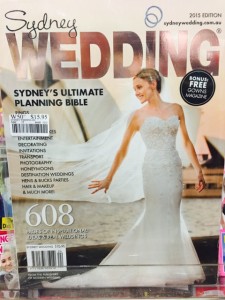 Sydney Wedding is a good example of why newsagents need control over magazines. It is think, takes up too much space and is unlikely to sell for us in Melbourne.
Sydney Wedding is a good example of why newsagents need control over magazines. It is think, takes up too much space and is unlikely to sell for us in Melbourne.
Bauer reps say to the ACCC they want to help newsagents be more engaged and more professional with magazines at the same time as they send out this title which will lose money for us.
If I had control I would have said no thanks to this title. I have a good range of wedding magazines and no space for this title. Sending it wasted my time topping it and returning the cover. No I did not give it time on the shelves as there was no space.
If you received Wedding Styling Handbook this week from Bauer Media read on
 A newsagent colleague called me yesterday with news the newsagency received Wedding Styling Handbook issue #1 for the fourth time. First time around their received 4 copies and sold all. Two months later they received 5 copies and returned 3. Four months later they received 3 and returned 3. This title was done after the first two go rounds. The newsagency shelves were full. They have an excellent range of wedding titles. How long will Bauer continue to hit this newsagent with extra stock of this title? As you would expect, the newsagent early returned the title.
A newsagent colleague called me yesterday with news the newsagency received Wedding Styling Handbook issue #1 for the fourth time. First time around their received 4 copies and sold all. Two months later they received 5 copies and returned 3. Four months later they received 3 and returned 3. This title was done after the first two go rounds. The newsagency shelves were full. They have an excellent range of wedding titles. How long will Bauer continue to hit this newsagent with extra stock of this title? As you would expect, the newsagent early returned the title.
Check if you have been sent issue #1 of Wedding Styling Handbook. Consider early returning – check your sales data.
Bauer says it wants to do the MPA magazine new supply rule trial to help newsagents. Maybe they should spend their time helping not sending the same issue of this title over and over.
What Bauer has done here makes a mockery of their MPA submission and goes to the distrust newsagents have for them. It makes newsagents less competitive than supermarkets as it takes, time, space and cash which supermarkets do not have to spend.
MPA seeks to vary magazine pilot arrangements
The ACCC advised yesterday that the MPA is seeking to vary arrangements for the pilot to test magazine supply rule changes.
Click here to see the MPA letter. Click here to see the annexure. This latest correspondence from the MPA does not trial magazine supply changes that enable newsagents to be competitive with others. The concerns raised in my video earlier this week have not been addressed.
What newsagents need to know about the MPA trial of proposed magazine supply rule changes
Here is a video I shot Monday this week to explain what I think newsagents need to know about the trial of new magazine supply rules proposed by three magazine publishers. It’s a long video but brings to the view concerns about the facts. Please watch it.
In the video you are provides quotes from documents and links to publicly available documents.
Click here to see the minutes of the ACCC conference as released today by the ACCC.
Mumbrella covers MPA newsagent magazine supply rule change proposal
Media news website Mumbrella yesterday covered the ACCC conference held last week to consider the application by the MPA to trial new magazine supply rules. I appreciate the time they took to learn about the proposed trial and the concerns it represents for newsagents.
This the first time I can recall such public coverage of the uncompetitiveness of magazine supply to newsagents compared to our competitors. It is good to see the story out there.
Newsagents interested in the issue of magazine supply should read the Mumbrella report.
I wish the ANF would be more complete in its coverage, more transparent with newsagents. Yesterday, they published a post which I say shows the ANF acting as a mouthpiece for the MPA when they should be the mouthpiece for newsagents. In a comment to the post the ANF says: there are no plans to disallow early returns. The problem for the ANF is that rule 4 from the MPA says:
A Distributor will not be required to accept Early Returns from Retailers, except where such Early Return is made by a Retailer to correct an error in allocations quantity.
The ANF needs to stop defending the trial by saying any trial is better than no change. They need to robustly represent newsagents if they are to recover credibility from their current low point. They need to demonstrate to newsagents that they are fighting for them and not publishers.
As I told Mumbrella yesterday:
“Newsagents want to be magazine specialists, they want to be the go to place for all your special interests. That is only going to continue if we can find a way for that to be economically viable,” he said.
People at the ANF seem to think I am against change in magazine supply. Not true – I am all for change, fair change. It is unreasonable for newsagents to accept anything which does not improve our ability to compete as that is of no benefit to us.
The folks at the ANF need to realise that newsagents deserve professional, thorough and energetic leadership – backed with open communication.
On the ANF website yesterday the ANF appeared to suggest the no early returns was for the purpose of this trial only. The documentation submitted to the ACCC by the MPA does not indicate that. Further, if this was the case the MPA members could have ensured fair supply and therefore seen early returns decline – and negated the need for the trial. Publishers do not trust this will happen because magazine distributors Gotch and Network have driven newsagents to use early returns as the only reasonable in-store magazine management tactic.
Finally, I have heard from several newsagents that they have been approached by ANF representatives to discuss this matter and the ANF reps comment about what I have written here. To date, no one from the ANF has contacted me on this issue.
Another example of oversupply of small business newsagents by Bauer Media
 While Bauer Media representatives said to the ACCC last they want to help newsagents with a fairer magazine supply model, back at the office the people reporting to them scaled out HOME ENTERTAINMENT: THE ULTIMATE GUIDE to newsagents. This publication was tagged New for 2014. Seriously, new for 2014. What happened yesterday is that newsagents received this title for the second time. Bauer send back out for another go around this old title.
While Bauer Media representatives said to the ACCC last they want to help newsagents with a fairer magazine supply model, back at the office the people reporting to them scaled out HOME ENTERTAINMENT: THE ULTIMATE GUIDE to newsagents. This publication was tagged New for 2014. Seriously, new for 2014. What happened yesterday is that newsagents received this title for the second time. Bauer send back out for another go around this old title.
Sending it a few days before the end of the month as they have, it is fair for newsagents to see this as a cash grab by Bauer. many newsagents will not be able to return it in enough time for it to NOT be charged this month.
This is appalling behaviour by Bauer Media. Shame on them. I think this supply is socially irresponsible. It makes small business newsagents less competitive than the supermarkets chasing our magazine revenue.
Four newsagents contacted me about this. each was angry at the treatment they received from Bauer.
Oversupplied The Block magazine
 A year ago we received 31 copies of The Block magazine and returned 22. This year, taking no notice of our sales data, Bauer supplied us 31 copies again. Last year we promoted the title prominently. This year we are not. We have better use for the same. Saturday, I early returned stock of this title.
A year ago we received 31 copies of The Block magazine and returned 22. This year, taking no notice of our sales data, Bauer supplied us 31 copies again. Last year we promoted the title prominently. This year we are not. We have better use for the same. Saturday, I early returned stock of this title.
At the ACCC conference Thursday last week Bauer representatives talked about how they want to help newsagents and how the proposed new magazine supply rules they the ACCC are key to this. This oversupply of The Block title is a harm they could have prevented without ACCC approval. That they so grossly oversupplied is what feeds into distrust newsagents have.
Newsagents may want to check supply of this title and resolve any early returns now.


